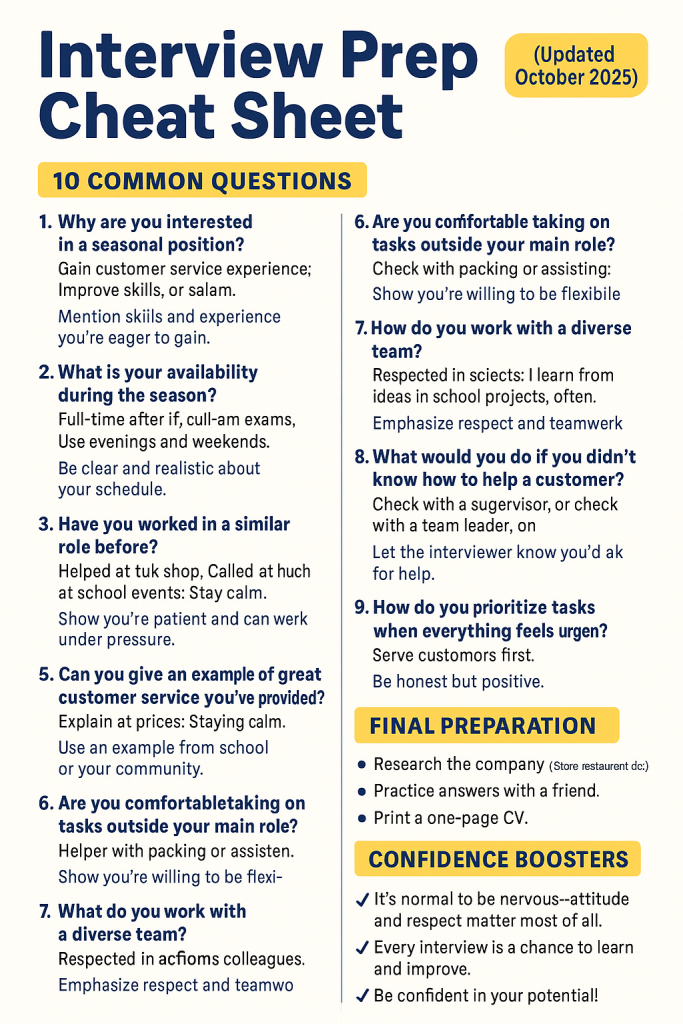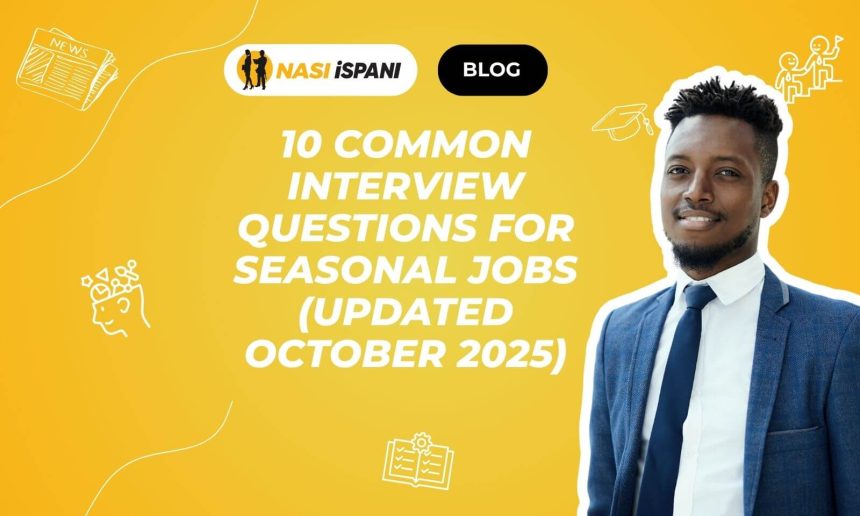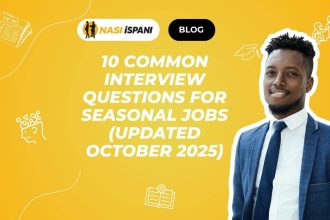Seasonal jobs are in high demand across South Africa every festive period. Retail stores, fast-food outlets, hotels, and delivery companies all hire extra staff between October and January to handle the holiday rush. For many young jobseekers, these roles are a first step into the workplace.
To secure one, you’ll need to get through the interview. The good news? Most companies ask the same set of questions to see if you’re reliable, motivated, and willing to learn. This guide covers the 10 most common seasonal job interview questions in 2025, with sample answers, tips, and confidence boosters designed for youth, students, and first-time workers.
10 Common Interview Questions for Seasonal Jobs
1. Why are you interested in a seasonal position?
Why they ask: To understand your motivation. They’re checking if you’ll take the role seriously or leave after two shifts.
How to answer: Balance honesty (you want income) with growth (skills, experience, career exploration).
Sample answers:
- Retail (Pick n Pay/Woolworths): “I’d like to gain customer service experience while earning income during the holidays. I enjoy working with people and I’d like to learn how stores operate during peak times.”
- Hospitality (Spur/Nando’s): “I want to improve my communication and teamwork skills while serving customers. This will also help me build confidence in handling busy situations.”
- Logistics (Takealot/Courier): “I’m interested in learning about stock handling and fast-paced teamwork. I know logistics is about precision, and I’d like to contribute during the busy festive season.”
What the interviewer wants to hear: You see the job as valuable experience, not just money.
Confidence tip: Add one line about personal growth. Example: “I want to grow my skills for future opportunities.”
Practice exercise: Write down three reasons why this job benefits you beyond money (skills, confidence, teamwork).
2. What is your availability during the season?
Why they ask: December = long hours, weekends, public holidays. They want reliability.
How to answer: Be clear and realistic. If you can’t work certain times, explain upfront.
Sample answers:
- Matriculant: “My exams end mid-November. I’m available full-time after that, including weekends and public holidays.”
- Student: “I can work evenings and weekends now, and full-time during December and January.”
- Unemployed: “I’m fully available, including overtime and flexible shifts.”
What the interviewer wants to hear: You understand festive demand and will commit.
Confidence tip: Employers prefer honesty. Don’t promise 24/7 if you can’t.
Practice exercise: Create a personal availability schedule and memorise it.
3. Have you worked in a similar role before?
Why they ask: To gauge readiness. But “experience” includes unpaid roles like volunteering or helping family.
How to answer: If no experience, highlight transferable skills.
Sample answers:
- Retail: “I’ve helped at my aunt’s tuck shop, selling snacks and handling cash. That taught me customer service.”
- Hospitality: “At school events, I assisted with food sales and serving, which taught me teamwork and speed.”
- Warehouse: “I don’t have logistics experience, but I organised stock at a community fundraiser, lifting and sorting items.”
What the interviewer wants to hear: You’re responsible, even without a formal job history.
Confidence tip: Replace “no experience” with “I’ve learnt from…”
Practice exercise: Write down 2–3 examples where you acted responsibly (school, family, community).
4. How would you handle a busy shift with long queues or many customers?
Why they ask: To test calmness under pressure.
How to answer: Show patience, efficiency, teamwork.
Sample answers:
- Retail: “I’d greet customers politely, work quickly, and ask for backup if queues get too long.”
- Hospitality: “I’d focus on accuracy with orders, stay friendly, and support colleagues to keep things moving.”
- Warehouse: “I’d follow supervisor instructions carefully and focus on speed and accuracy when packing.”
What the interviewer wants to hear: You won’t panic—you’ll stay calm, respectful, and efficient.
Confidence tip: Think of busy exam halls—you managed those. Apply the same calmness.
Practice exercise: Practise a 30-second answer out loud that shows how you’d stay calm under pressure.
5. Can you give an example of great customer service you’ve provided?
Why they ask: Customer service defines festive jobs.
How to answer: Use a real example, even outside formal jobs.
Sample answers:
- Retail: “At a school market day, a customer was confused about prices. I explained clearly and thanked them.”
- Hospitality: “Helping at a church lunch, I made sure everyone was served politely, even when we were busy.”
- Warehouse: “I supported my team by double-checking stock so customers received the correct orders on time.”
What the interviewer wants to hear: You understand politeness and patience.
Confidence tip: Customer service = treating people well. You already practise it daily.
Practice exercise: Think of 2 times you helped someone and felt proud.
6. Are you comfortable taking on tasks outside your main role?
Why they ask: Seasonal jobs require flexibility.
How to answer: Show willingness to help wherever needed.
Sample answers:
- Retail: “I’m open to helping with restocking, cleaning, or assisting colleagues.”
- Hospitality: “If needed, I can help in the kitchen, serve customers, or clean tables.”
- Warehouse: “I’m comfortable moving between picking, packing, and loading roles.”
What the interviewer wants to hear: You’re a team player, not rigid.
Confidence tip: Adding “I’m eager to learn new skills” makes you stand out.
Practice exercise: Write a list of small tasks you’d be open to doing outside your main role.
7. How do you work with a diverse team?
Why they ask: South African workplaces mix ages, languages, and cultures.
How to answer: Highlight respect and adaptability.
Sample answers:
- “At school projects, I worked with classmates from different backgrounds and learnt to respect everyone’s input.”
- “I’m comfortable learning from older colleagues and listening when I don’t understand something.”
What the interviewer wants to hear: You’re respectful and adaptable.
Confidence tip: Show you’re willing to learn from anyone.
Practice exercise: Think of 1 example where you worked with people different from you.
8. What would you do if you didn’t know how to help a customer?
Why they ask: They want honesty over guessing.
How to answer: Show initiative to find the correct answer.
Sample answers:
- Retail: “I’d let the customer know I’ll check with a supervisor and get back to them quickly.”
- Hospitality: “If unsure about a menu item, I’d ask the kitchen staff before replying.”
- Warehouse: “If I couldn’t locate stock, I’d ask a team leader rather than give wrong info.”
What the interviewer wants to hear: You’ll solve problems correctly and politely.
Confidence tip: Saying “I’ll check and get back to you” shows maturity.
Practice exercise: Practise this phrase: “Let me check with my supervisor and I’ll get back to you shortly.”
9. How do you prioritise tasks when everything feels urgent?
Why they ask: Seasonal jobs = multitasking.
How to answer: Show you’ll serve customers first and follow supervisor guidance.
Sample answers:
- Retail: “If customers are waiting, I’d serve them first, then return to restocking.”
- Hospitality: “I’d focus on orders first, then clean and reset tables.”
- Warehouse: “I’d pack urgent orders first, then continue with the rest.”
What the interviewer wants to hear: You understand priorities and will ask for guidance when unsure.
Confidence tip: Repeat the “customers first” rule—it always applies.
Practice exercise: Write down how you’d handle 3 tasks at once, then order them by importance.
10. What are your plans after the seasonal job ends?
Why they ask: They want to know if you’ll finish the contract and whether you’re open to staying.
How to answer: Be honest but show commitment.
Sample answers:
- Student: “I’ll return to my studies in February, but I’m open to part-time work on weekends.”
- Unemployed: “I’d love to continue working if opportunities open, but my first goal is to complete the festive season successfully.”
What the interviewer wants to hear: You’ll commit for the season, and you have a direction afterward.
Confidence tip: Avoid “I don’t know.” Show some plan.
Practice exercise: Write one line about your career or study plans.
Also check: Best Places to Find Part-Time Jobs for Students This 2025 Festive Season
Final Preparation Checklist
Before the Interview
- Research the company (Shoprite, Spur, Takealot).
- Print a neat one-page CV.
- Practise answers with a friend.
On the Day
- Dress neatly (clean shirt, closed shoes).
- Arrive early.
- Greet politely, smile, and maintain eye contact.
Don’ts
- Don’t arrive late.
- Don’t chew gum.
- Don’t give one-word answers.
- Don’t lie about experience.
Confidence Boosters
- Employers know you’re nervous—it’s normal.
- A positive attitude and respect matter more than perfect answers.
- Every interview, even unsuccessful, builds your confidence for the next one.
Read more: The Ultimate Checklist Before Your First Job Interview
Frequently Asked Questions
1. What are the most common interview questions for festive jobs?
Most employers ask about your availability, why you want the job, how you handle pressure, and your ability to work in a team. Expect questions like: “Why are you interested in a seasonal role?”, “How would you handle a busy shift?” and “What are your plans after the season?”
2. How do I prepare for a retail interview with no experience?
Focus on transferable skills. Talk about times you’ve helped at school, in your community, or at home. For example, if you’ve assisted with events, you already know how to work in a team and serve people politely. Employers don’t expect you to know everything—they want to see that you’re eager to learn.
3. What should I say if I’ve never worked before?
Be honest, but focus on responsibility. Say something like: “I haven’t had formal work, but I’ve helped at school events and learnt to work with people and manage tasks.” Employers hire attitude as much as experience.
4. How should I dress for a festive job interview?
You don’t need expensive clothes. Keep it clean, neat, and professional. A collared shirt, trousers, or a simple dress with closed shoes works well. Make sure your clothes are ironed and tidy.
5. What do employers look for in seasonal workers?
They want staff who are reliable, flexible, and polite. If you can work weekends and holidays, stay calm under pressure, and treat customers with respect, you already stand out.
6. How early should I arrive for an interview?
Aim to be 15–20 minutes early. It shows respect for the employer’s time and helps you calm down before the interview starts.
7. How do I answer questions about availability if I have limited time?
Be honest. Say: “I’m available evenings and weekends, and I’ll be full-time after exams.” Employers prefer truth upfront rather than finding out later you can’t work key shifts.
8. What if I get nervous and forget my answers?
It’s normal to be nervous. Take a breath, smile, and answer simply. Employers don’t expect perfect speeches—they want to see you try your best and stay polite.
9. What should I avoid saying in a seasonal job interview?
Avoid one-word answers like “yes” or “no.” Don’t complain about past jobs, don’t lie about experience, and don’t say “I only want money.” Always frame your answers around learning, teamwork, and reliability.
10. Can a seasonal job lead to a permanent position?
Yes. Many companies keep seasonal staff who perform well. If you show up on time, stay positive, and work hard, you could be offered a part-time or full-time role after the season ends.
Infographic: Quick Cheat Sheet
Here’s a one-page infographic you can save or print for quick preparation:

Seasonal jobs are your gateway to the world of work. They may last a few months, but the lessons—punctuality, teamwork, customer service—last a lifetime.
These 10 seasonal job interview questions aren’t there to trick you. They’re your chance to show you’re reliable, eager, and ready to learn.
Walk into your interview prepared, smile, and remember: employers hire attitude as much as experience. Your first festive job might be the start of your career journey.
Also check: The Role of NYDA in Fighting Youth Unemployment



